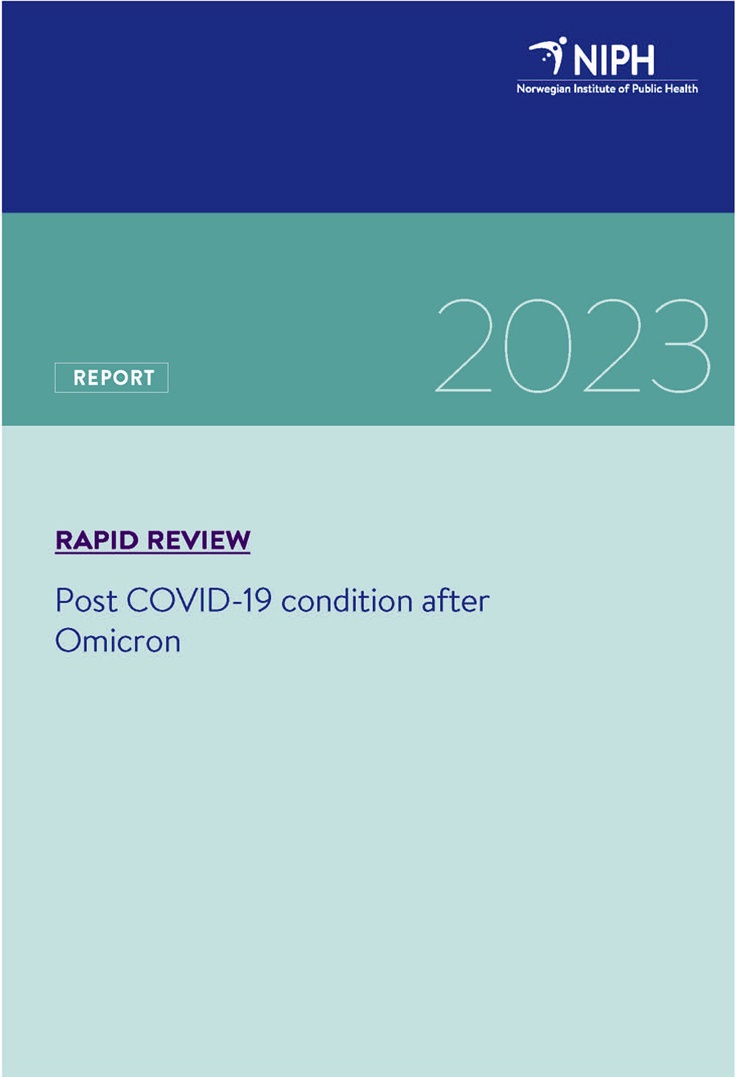Post COVID-19 condition after Omicron: Rapid review
Report
|Published
We aimed to summarise research on the proportion of patients who report long-term symptoms at least 6 months after Omicron infection, which long-term symptoms occur after COVID-19 due to the Omicron variant, how long the symptoms persist and which patient groups that have the greatest risk of experiencing long-term symptoms.
Summary
Background
Most people will experience COVID-19 as a mild and transient disease, although some may experience a prolonged period with symptoms. Long-term and nonspecific symptoms have previously been reported following other viral infections, and after bacterial and parasitic infections. It is also known that people who are admitted to the intensive care unit due to severe lung failure caused by other diseases than COVID-19, can report long-term functional impairments such as impaired cognitive function, mental health problems and reduced lung function after discharge. As of early 2023, most of the Norwegian population is vaccinated and has undergone an infection with the Omicron variant. We are not aware of research relevant on this population group compared to non-COVID-19 controls, hence there is a need to review primary research systematically.
Objectives
We aimed to summarise research on the proportion of patients who report long-term symptoms at least 6 months after Omicron infection, which long-term symptoms occur after COVID-19 due to the Omicron variant, how long the symptoms persist and which patient groups that have the greatest risk of experiencing long-term symptoms.
Methods
We have previously published a rapid review about Post COVID-19 condition that was last updated in December 2022. The review published in December 2022 included data on all previous SARS-CoV-2 variants, whereas the current review is limited to post COVID-19 condition following infections caused by Omicron. This report supplements the December 2022 report, in which we limited our search to probable Omicron cases. We included controlled studies with more than 300 mainly laboratory test positive COVID-19 cases with a follow-up time of six months or longer. We excluded studies mainly reporting on laboratory or radiological findings, uncontrolled studies, and controlled studies that had not been peer-reviewed.
The findings are based on systematic searches in MEDLINE and WHO Global research on coronavirus disease (COVID-19) database on April 14th, 2023. Two researchers screened the search results with machine learning support.
Results
We screened 6918 studies. No studies matching our inclusion criteria were identified.
Discussion
There is a lack of controlled studies examining the long-term effects of the Omicron variant compared to non-COVID-19 controls including vaccinated patients who experienced mild or moderate disease. The latter population is especially relevant to the Norwegian setting. While there are initial studies with short follow-up indicating a lower prevalence of long-term symptoms after Omicron infections, it is crucial to conduct more controlled studies to obtain reliable and comprehensive data.
Generalizing early findings from different populations to the broader society can be misleading and may not accurately reflect the specific situation in Norway. While the urgency of the pandemic has understandably driven researchers to publish their findings quickly, it is essential to prioritize thoroughness and quality in the research process. We see a need to conduct a new search for relevant research within a year of our search, to provide an up to date and reliable overview of evidence.
Conclusion
There is a lack of controlled studies that have investigated the long-term symptoms following an Omicron infection compared to non-COVID-19 controls. Preliminary evidence suggests that the health impacts after an Omicron infection differ in comparison to other SARS-CoV-2 variants. The earliest studies suggest that there may be a lower likelihood of long-term symptoms associated with Omicron. Assumptions derived from studies conducted during the early stages of the pandemic are less relevant to the current context. This is of particularly relevance in Norway, where most of the population was vaccinated prior to infection to the clinically milder Omicron variant. There is a need for controlled studies to be conducted on the late effects that may result from an Omicron infection to guide public policy decisions.


